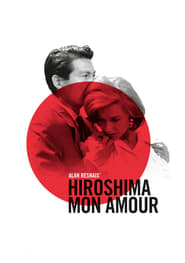
In 1959 Alain Resnais was a documentary filmmaker, having made, among others, the first documentary about the Holocaust (Night and Fog). At the time he was commissioned to make a similar type documentary concerning the nuclear bombing of the Japanese city of Hiroshima. It was while in the middle of making this film, that he decided that Hiroshima was the background he needed to make his first dramatic feature film.
The result is, “Hiroshima Mon Amour”. In it he places a married French actress (The superb Emmanuelle Riva), within the rebuilt but still devastated city, as she stars in a movie ironically about peace. It is while there that she meets an also married Japanese architect (Eigi Okada). They have a one night affair and seemingly fall in love with each other. The architect speaks French, which allows the two to engage in a long protracted conversation about the past, love and the anguish and pain of war.
The backdrop of the surviving but deeply wounded city of Hiroshima fits perfectly within their deep pain and angst. While happily married, the architect, who was fighting as a soldier when the bomb was dropped, suffers from the loss of all of his immediate family who were living in the city during the nuclear blast. The actress has a dark secret from her past and also from the war. This past is relayed in the film through intricately placed, randomly sparsest segments of flashbacks.
Throughout it all, the couple wonder through the streets of Hiroshima. Resnais opens his film with actual documented footage of the immediate aftermath to the devastating bombing. Images as shocking as those shown in his previous documentary about the Holocaust, with graphic footage that sent me to a dark and somber place, as the love story started to unfold. Her terrible memories were opened not by the present new love, but rather by the pain and suffering of the city.
Throughout it all, I was left with a strong and visual impression of history. The Nuclear bombing and its destructive effects had already become a tourist attraction just 14 years after it occurred. Museums of suffering and bomb site tours had at the time become part of the City’s present reality. The flashback sequences refer to a very personal suffering that happened to the actress in a small French town called Never. I appreciated the English definition of that town’s name. Never as in “Never again”. More than a few times within the couple’s conversations, the statement, “Hiroshima and Never” is uttered out loud, as the architect tries to relate to what had happened to his new love. To me, the statement, “Hiroshima and Never”, also meant to define, “Never again”, in regards to nuclear war.
The Architect’s suffering is part of a greater tragedy and as such appears less personal. By the end of the film and through the poignant flashbacks, I realized that his suffering was just as personal as hers.
At one point Resnais gives a clear reference to the classic film, “Casablanca”, which ties the forbidden love during war themes permeating in both films.
We are never given privy as to how our two lovers met, making the films inconclusive ending on target.
While not a very enjoyable watch, “Hiroshima Mon Amour” is an emotional tour de force that needs to be seen by all lovers of great cinema.

